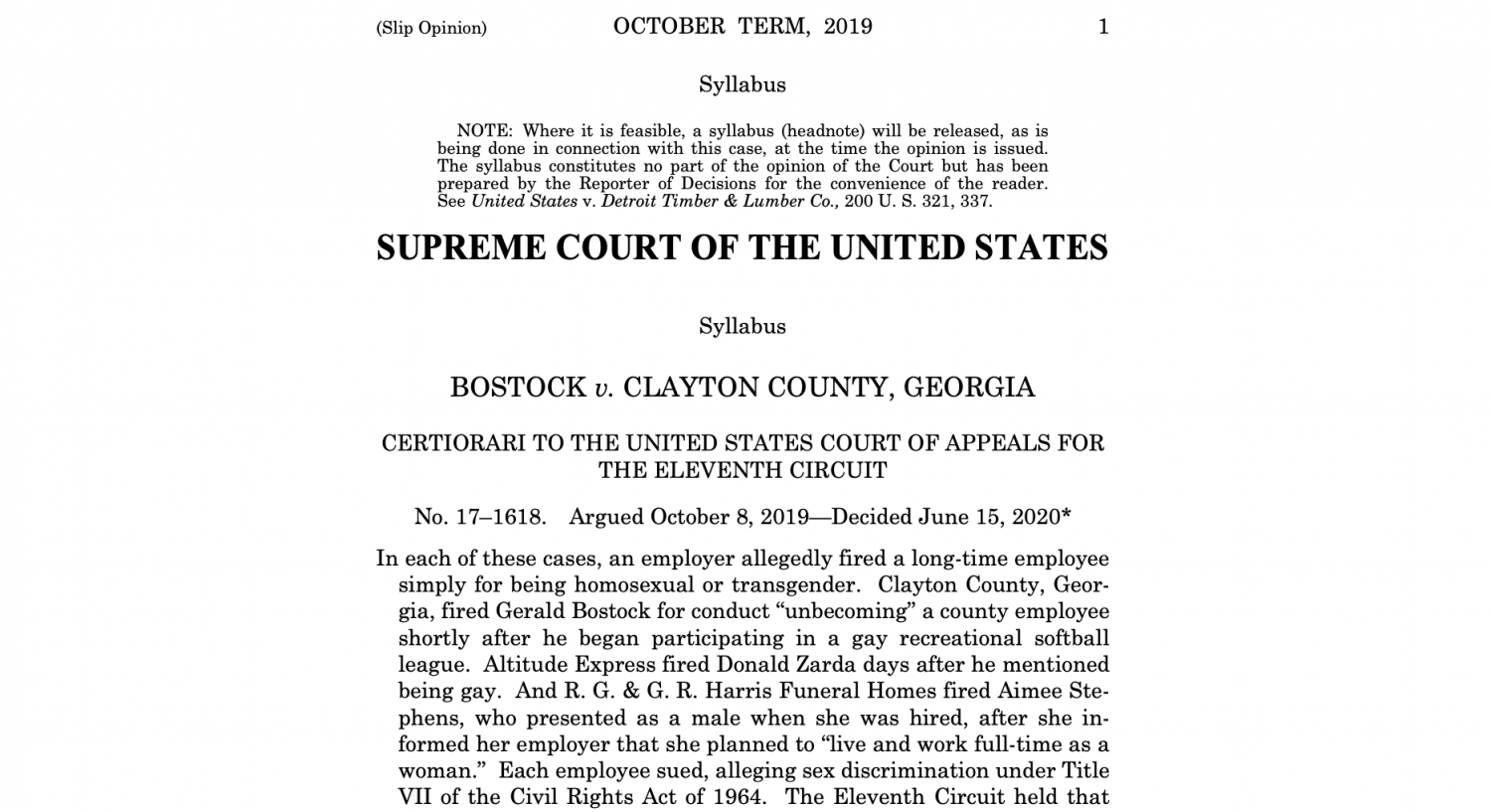Today, the U.S. Supreme Court, in a 6-3 decision, ruled that Title VII of the Civil Rights Act of 1964, the federal law that prohibits discrimination on the basis sex, also protects employees from discrimination on the basis of their sexual orientation or gender identity. Today’s decisions confirm workplace anti-discrimination protections for LGBTQ people across the country. Lambda Legal celebrates these rulings.
In the opinion, Justice Gorsuch wrote that when an employer fires an individual for being LGBT “fires that person for traits or actions it would not have questioned in members of a different sex. Sex plays a necessary and undisguisable role in the decision, exactly what Title VII forbids. … the limits of the drafters’ imagination supply no reason to ignore the law’s demands. When the express terms of a statute give us one answer and extratextual considerations suggest another, it’s no contest. Only the written word is the law, and all persons are entitled to its benefit.”
“Finally. Today, the law, justice and fairness are on our side. Our nation’s highest court confirmed what Lambda Legal has argued for years, that discrimination against LGBTQ workers is illegal,” said Kevin Jennings, CEO of Lambda Legal. “We have a long way to go in securing the full and undeniable civil rights of LGBTQ people, especially those in our community who are Black, Indigenous and people of color for whom their sexual orientation or gender identity is only one of many barriers to equal opportunity in this country. But today’s victory is a necessary step forward on the journey toward equal justice for all without caveats or qualifications. The overwhelming majority of people in the country understand that discrimination is wrong, and so we intend to build on the momentum created by today’s decision to push for the comprehensive federal protections contained in the Equality Act, passed by the House of Representatives more than one year ago. The Equality Act solidifies the workplace protections recognized by the Court today and, critically, it also updates and expands protections in the marketplace and public services not only on the basis of sexual orientation and gender identity, but also on the basis of race, color, sex, national origin and religion in the workplace, the marketplace, and beyond.”
For years, Lambda Legal has appeared in courtrooms across the country arguing successfully that discrimination on the basis of sexual orientation or gender identity is, by definition, discrimination on the basis of sex and therefore prohibited by federal law. Lambda Legal argued the only two federal appellate cases before today holding that Title VII protects employees from discrimination on the basis of sexual orientation: our Seventh Circuit en banc win in Hively v. Ivy Tech Community College, and as amicus in the Second Circuit en banc n Zarda v. Altitude Express, which decision the Supreme Court affirmed today. Lambda Legal also won a landmark victory on behalf of transgender workers in Glenn v. Brumby, which vindicated the rights of a Georgia state employee fired for announcing her gender transition.
“It is incredibly gratifying to have the Supreme Court confirm what Lambda Legal and others have been arguing for years – federal sex discrimination laws protect against discrimination on the basis of a person’s sexual orientation or gender identity. Every LGBTQ worker deserves the protections that our country’s federal law provides by its plain terms, and we are thrilled that today the Court agreed,” said Gregory Nevins, Senior Counsel and Employment Fairness Project Director for Lambda Legal.
“Today, the Supreme Court confirmed that our nation’s federal laws include lesbian, gay, bisexual and transgender people and that we have a right to be ourselves at work, and in doing so, our nation’s highest court, for the very first time, has also affirmed our humanity and dignity,” said Diana Flynn, Litigation Director for Lambda Legal. “In our hearts, we understand that we deserve to exist and be treated equally, the law was clearly on our side and the Court agreed. This is an incredible step forward in the civil rights of transgender people and the ripple effect of this decision will be far-reaching. I wish Aimee Stephens were here to see the impact she had on the rights of transgender people, by simply insisting that she and everyone in our community deserve better.”
“Today’s decisions are an important victory, but alone are not enough to fill the gaping holes that remain in the hodgepodge patchwork of rights and protections that currently exist for LGBTQ people, particularly at a time when the Trump administration has sought to diminish those protections at every turn. We now look to Congress to address the critical gaps in our federal civil rights laws by passing the Equality Act,” added Jennings. “Our communities are always vulnerable, but especially so during a national public health crisis. The House of Representatives passed the Equality Act over one year ago. We know Senators can multitask. While they must address the dual pandemics of COVID-19 and discriminatory police violence, and the disproportionate impact both have on Black and Brown lives, they must also take the Equality Act over the finish line so that our communities can finally have comprehensive nondiscrimination protections.”
The Equality Act updates existing federal nondiscrimination laws—including the Civil Rights Act of 1964, Title IX, the Fair Housing Act and provisions of the ACA—to confirm that discrimination based on sexual orientation or gender identity is unlawful. In addition to confirming these sex discrimination protections for LGBTQ people, the Equality Act also adds protection against discrimination based on sex, sexual or gender identity in public accommodations and federally funded programs. In May 2019, the U.S. House of Representatives passed the bill. The U.S. Senate has yet to take any action on the Equality Act.





